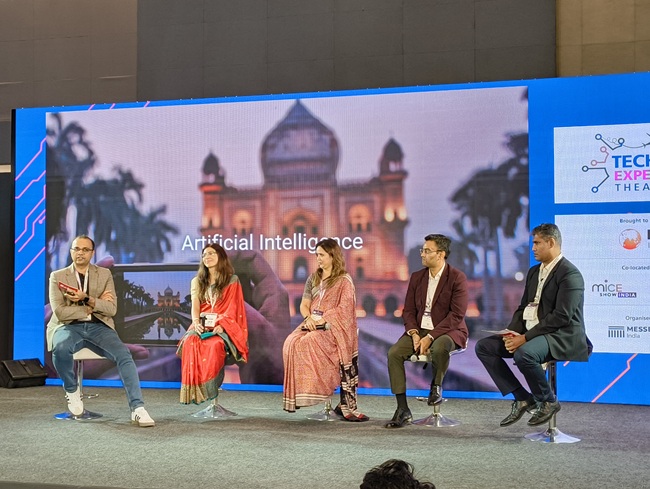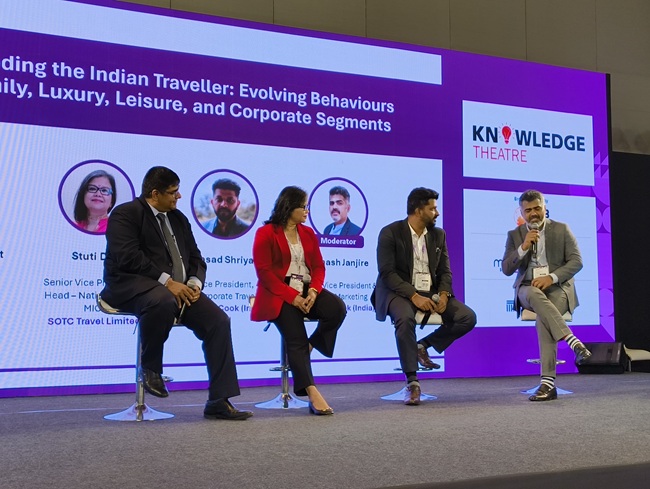The third edition of ITB India opened with considerable momentum at the Jio World Convention Centre, signalling a renewed energy and upward trajectory for South Asia’s tourism industry. Day one offered an exciting mix of global exhibitor showcases, insightful keynote sessions, and thought-provoking panel discussions, all under the overarching theme, “The Business of Experience: Curated Travel for Targeted Growth.”


The show floor buzzed with activity as prominent global tourism boards and destinations, including Wonderful Indonesia, Visit Northern Finland, the Ministry of Heritage and Tourism of Oman, and the Sarawak Tourism Board, welcomed visitors. The diversity of offerings was matched by a strong turnout from official partner states in India—Andhra Pradesh, Chhattisgarh, and Madhya Pradesh—who spotlighted the country’s deep cultural and regional richness.
With over 400 exhibitors and 600+ qualified buyers, thousands of productive meetings were held, paving the way for future collaborations and fresh business opportunities across the MICE, corporate, leisure, and travel technology segments.
Tourism veteran Mr. Prateek Hira, Founder & CEO of Tornos, set the tone for the day with his compelling take on evolving travel trends. He noted, “Today’s traveler is no longer just sightseeing; they are sight-experiencing. Experiential tourism isn’t an add-on—it’s the core of what drives modern travel.” He emphasised that destinations must recognise the extraordinary in the ordinary to curate immersive and authentic experiences for visitors.


In a standout session titled “Standing Out in a Sea of Content: Winning Hotel Bookings in a Fragmented Market,” a panel of travel tech experts and hospitality leaders explored the increasing challenges faced by hotels in a rapidly evolving digital landscape. Moderated by Samuel Machado, Managing Director – India & South Asia of Sabre Corporation, the discussion addressed how the proliferation of multi-sourced content is creating new levels of market fragmentation. A global survey from Sabre revealed that over 91% of travel agencies use four or more booking systems, with over half managing seven or more. This creates a significant challenge for hoteliers, making it harder than ever to stand out, reach the right audience, and convert demand. The session’s speakers – including Jimmy Jacob Chacko of Sabre Corporation, Karishma Singh of Indian Hotels Company Limited (IHCL), Amit Singh of Radisson Hotel Group, and Sakshi Sehdev Dogra of Wyndham Hotels & Resorts -delved into the latest trends and strategies to help hoteliers cut through the noise. They outlined how to boost visibility across fragmented channels, drive hotel bookings through travel sellers, and leverage AI to personalize offers and increase conversions, ultimately building a more connected and modern distribution strategy.
The role of technology and the next generation of travelers was a central focus. In the session “India’s Millennial and Gen Z Travellers: Digital Expectations in Global Journeys,” Santosh P., Founder of WSH, explored how digital-first behaviors are reshaping travel planning and preferences for younger Indian travelers. Meanwhile, the Tech Leaders’ Panel on Innovation in Travel Technology, featuring Jaal Shah (Rezlive.com), Ankush Nijhawan (TBO.com), Neel Ghose (Skyscanner), and moderated by Virendra Jain (VIDEC Consultants), tackled the role of AI, automation, and emerging technologies in building future-ready travel ecosystems.
In a standout session, Parveen Chander, EVP of Indian Hotels Company Ltd (IHCL), explored how innovation and experience are redefining MICE hospitality. A related panel discussion, “Standing Out in a Sea of Content,” moderated by Samuel Machado (Sabre Corporation), brought hospitality leaders together to address the increasing content fragmentation in travel bookings. Panelists outlined strategies to boost visibility, personalize offers, and drive conversions using AI and integrated distribution models.


At the Knowledge Theatre, the session “Decoding the Indian Traveller” provided deep insights into shifting behaviors across the family, luxury, leisure, and corporate travel segments. Moderated by Shaurab Kapadia (Google India), the panel featured senior leaders from Thomas Cook and SOTC, who shared how digital adoption and changing preferences are redefining India’s outbound and domestic markets.
Anurag Jain, EVP – APMEA at RateGain, led an important discussion on transforming hotel commerce by leveraging AI and integrated technology solutions. He emphasised that while AI holds immense potential, foundational challenges such as system fragmentation and manual processes must be addressed first.


As attention spans shrink in the age of Reels and Shorts, the session “The Future of Attention: Conferences in the Age of Reels” provided valuable insights into how MICE planners can design high-impact formats that deliver genuine ROI and engagement. The panel discussion was moderated by the National Coordinator of Network of Indian MICE Agents and speakers include Dr. Anup Taraffdar, CEO of MICETrav.com and Mr. Rakesh Arora, Coordinator of NIMA.
Day two promises even more value with a robust lineup of sessions exploring India’s MICE evolution, innovation in travel technology, unlocking opportunities in India’s outbound boom, designing seamless business travel, and the shift from products to experiences. With digital transformation, experiential travel, and sustainability at the forefront, ITB India continues to position itself as a strategic platform for travel professionals looking to shape the future of tourism in South Asia and beyond.
Also Read
Watch on Youtube
